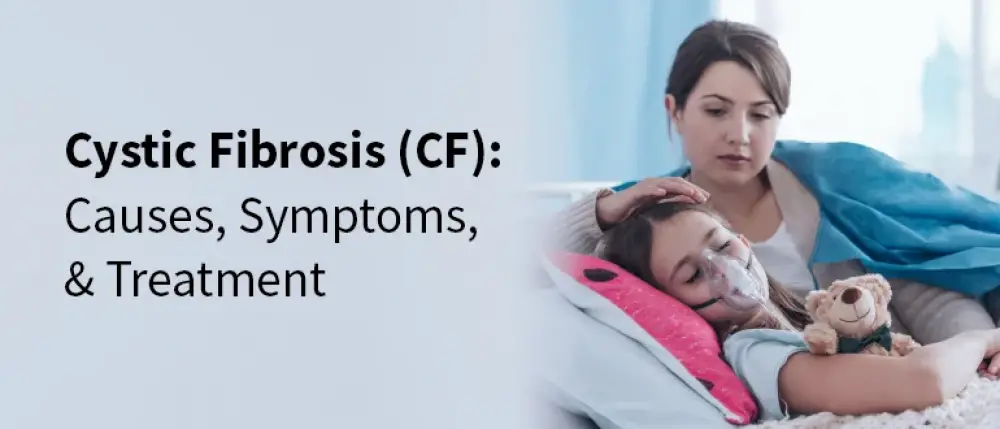Subscribe to get weekly insights
Always stay up to date with our newest articles sent direct to your inbox
Published on 29 Apr, 2024
1194 Views
4 min Read

Written by Rashmi Rai
favorite0Like
favoriteBe the First to Like
Cystic fibrosis, or CF is a genetic disorder that causes the body’s protein to produce thicker and stickier mucus that builds up in most organs, especially in the lungs and pancreas. Ultimately, the mucus clogs the airways and makes it difficult for the CF patient to breathe. If left untreated or ignored, cystic fibrosis can lead to varied health complications, including inflammation, respiratory infection, and lung failures. Ultimately, CF disease can prove itself a life-threatening disease.
However, on-time cystic fibrosis diagnosis and the right medical treatment can improve the quality of a patient’s life and increase the chances of a reversal with no reoccurrence.
If you or anyone else in your family has been suffering from cystic fibrosis, you can better manage treatment by understanding what is cystic fibrosis. Let’s discuss in detail to understand cystic fibrosis, its causes, symptoms, diagnosis, and treatment.
Cystic Fibrosis Transmembrane Conductance regular gene is present in everyone’s body to control CFTR protein. However, when the CFTR protein does not function normally, it becomes the genesis of a genetic mutation which is known as cystic fibrosis disease. A CF patient does not produce slippery and watery mucus as usual. Due to the genetic mutation, the level of salt and water is reduced outside the cell membranes. As a result, it produces thicker and sticky mucus and creates trouble for the functioning of the lungs and pancreas. It blocks the airways and makes it difficult for the cystic fibrosis lungs to breathe.
Similarly, it prevents enzymes from breaking down the food in the pancreas. Babies who suffer from cystic fibrosis lungs or pancreas suffer from malnourishment because they lose their capability to absorb nutrients even from high-nutrient food. Ultimately, the CF patient can become the victim of liver failure, lungs failure, and other complicated diseases.
However, the right medical intervention can help the patient manage the risks and complications of cystic fibrosis disease. It has been proven that with the right cystic fibrosis case study and treatment, the CF patient can live a long life.
Cystic fibrosis is a genetic disease. It simply means that the hereditary genes of CF are cystic fibrosis causes. CF patients usually get the defective genes of cystic fibrosis from both their parents. The risk goes higher of the disease is in bloodline.
But, sometimes, patients without any genetic cystic fibrosis case history become the victims of this fatal disease. Sometimes, the patient suffering from cystic fibrosis becomes a carrier of CF for his family.
Since cystic fibrosis or 65 roses disease is a hereditary disease, newborn babies become the victims of this 65 roses disease in the initial years of their life. They suffer from the following classic cystic fibrosis symptoms:
Generally, adults suffer from atypical cystic fibrosis in later years of life, and its symptoms are less mild than classic cystic fibrosis. Let’s look at the following atypical cystic fibrosis symptoms:
Early cystic fibrosis diagnosis can stop the situation from reoccurrence. The following processes are followed to diagnose CF:
While there is no special cure for cystic fibrosi, your doctors can help you improve the quality of your life and help you live longer. They will help you with unblocking the airway passages in a myriad of ways. You will be guided on how to cough and breathe. This will help you lessen the symptoms of cystic fibrosis disease. Alongside, you can be given devices to loosen the level of mucus.
Furthermore, some steroidal or non-steroidal anti-inflammatory medications are given for cystic fibrosis treatment. Along with this, some antibiotics are prescribed to prevent the risk of lung infections, and inhaled medications are given to make the mucus slippery and watery.
But, if cystic fibrosis poses a threat to other complications, surgical intervention becomes vital. These may include:
Undergoing diagnostic tests and surgical procedures can be profoundly stressful experiences for anyone, not just emotionally but financially too. With careful foresight and planning, you can shield yourself from the repercussions of the soaring medical costs.
Care Health Insurance allows you to take proactive steps when you invest in a comprehensive health insurance cover. With the right plan, you will not just safeguard the happiness and security of your family but your financial well-being also. To avail the plan of your choice, kindly connect with our experts or visit the official website.
>> Also Read: Chronic Illnesses in Children
Disclaimers: The above information is for reference purposes only. Kindly consult your general physician for verified medical advice. The health insurance benefits are subject to policy terms and conditions. Refer to your policy documents for more information.
favoriteBe the First to Like
Thyroid : मामूली नहीं हैं महिलाओं में थायराइड होना, जानें इसके लक्षण और घरेलू उपचार Vipul Tiwary in Diseases
शुगर कंट्रोल कैसे करे? जानें, डायबिटीज में क्या खाना चाहिए Vipul Tiwary in Health & Wellness
हाई ब्लड प्रेशर को तुरंत कंट्रोल कैसे करें? देखें इसके उपाय Vipul Tiwary in Diseases
पैरों में दर्द किस कमी से होता है? जानें, इसके घरेलू इलाज Vipul Tiwary in Health Insurance Articles
Smog Season is Back: Are You Really Safe? Sejal Singhania in Health Insurance Articles
Amino Acids: The Unsung Heroes of Your Mental Well-being Jagriti Chakraborty in Mental Health
8 Reasons to Start Your Morning with Ajwain Water Jagriti Chakraborty in Home Remedies
Ice Water Face Dip: The 15-Second Beauty Hacks Celebs Swear By Jagriti Chakraborty in Home Remedies
Always stay up to date with our newest articles sent direct to your inbox
Loading...